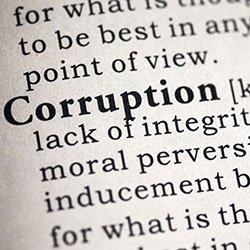 A recent article in Forbes – ‘Supply Chain Corruption: Procurement’s Dirty Secret’ – questions how close we are to a universally transparent and law-abiding procurement culture. The author, Jonathan Webb, argues that even amongst the largest corporates we are still some way off and looks at some of the implications.
A recent article in Forbes – ‘Supply Chain Corruption: Procurement’s Dirty Secret’ – questions how close we are to a universally transparent and law-abiding procurement culture. The author, Jonathan Webb, argues that even amongst the largest corporates we are still some way off and looks at some of the implications.
Challenging complexity
The complexity of multinational companies’ supply chain arrangements has long been a barrier to upholding procurement laws and best practice. Webb argues that the result is that the supply chains of goods we use on a daily basis, that we rely on and have come to take for granted, are often subject to corporate bribery. The complexity of the arrangements that end with products such as the phone in your pocket, for example, means that the overall procurement process is almost impenetrable to industry authorities.
Webb even suggests that our purchases, albeit unwittingly, continue to ‘encourage criminality, stifle clean competition and support dirty politicians’ around the world.
Tackling the issues
However, there are signs that efforts are being made to clean up multinationals’ procurement activities. Webb cites the recent suspensions and ongoing investigations regarding football’s world governing body, FIFA, as highly relevant.
Firstly, efforts against bribery are being brought into public consciousness via a high profile scandal. But secondly, and more importantly, corruption amongst non-public organisations is being tackled.
The US investigation of FIFA’s alleged wrongdoing was unable to call upon the Foreign Corrupt Practices Act (FCPA) in its assessment, as this is reserved solely for government corruption issues. So a 1970s law originally designed to combat mafia activity was dug up. Elsewhere, similar laws have recently been implemented or updated: Britain and Switzerland have both outlawed bribery – whether it occurs in public or private arenas.
Responsible investment
With the current focus on corruption, procurement professionals can hardly claim ignorance. Instead, it is their responsibility to understand their supply chain and ensure complete transparency. Furthermore, they should communicate to all contractors with which they do business that attempts at bribery will not be tolerated.
Procurement corruption’s implications
The costs of bribery, collusion and corruption include the financial impact it has only bidders who invest in participating in tender processes without a real chance of being successful. A lack of fair, transparent process may also mean that the buying organisation isn’t getting the right solution for them. Organisations tainted by accusations of corruption may also deter potential backers from making investments.
The final frontier, though, Webb ponders, is whether large organisations can place integrity over expediency and relentlessly pursue fair practice. At some point, buyers will need to show their mettle by turning down contracts where any questions regarding ethical conduct cannot be answered. Until this occurs, it’s impossible to foresee 100% procurement cleanliness.

